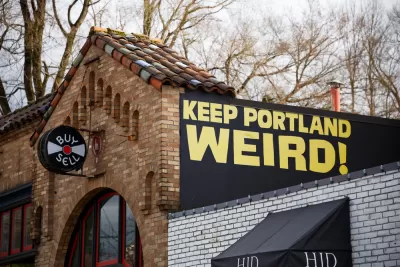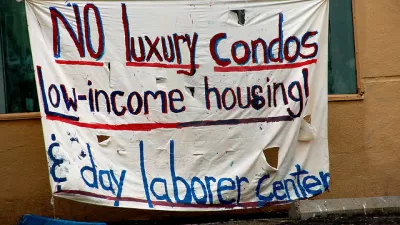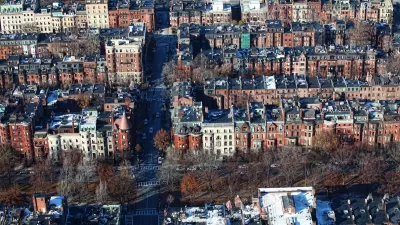Now that tech companies have "discovered" Portland, Oregon, longtime residents question whether the progressive city has done enough to protect them from displacement. Sound familiar?

In the past few years, major tech companies like Google, Airbnb, and Amazon have opened offices in Portland. As housing prices, rents, and evictions skyrocket, the specter of San Francisco looms large.
But a fate of displacement and unattainable housing is not necessarily inevitable, Alana Semeuls points out in The Atlantic—if the city takes action:
[I]t’s not tech or newcomers that are solely to blame. Portland hasn’t been able to slow its rental crisis because in a city that prides itself on progressivism, many of the traditional tools used to create more affordability are off the table.
Semeuls notes a lack of protections for tenants in Portland, as well as throughout the state. In September 2015, conditions drove the Community Alliance of Tenants, a nonprofit, to declare a renter state of emergency.
Thanks in part to pressure from CAT and other groups, the city has begun enacting some tenant protections and affordability measures. A month after CAT's petition, the City Council declared its own housing emergency, and the mayor promised $20 million for affordable housing projects in North and Northeast Portland. Tech companies have also expressed interest in keeping Portland affordable—having moved there, Semeuls writes, in part to avoid the expense of being in San Francisco.
But these efforts have met resistance from some Portland residents who oppose increasing neighborhood density. As the debate continues to play out—and, some say, call the city's progressive identity into question—CAT’s executive director notes: "There are limits to white urban liberalism. When it comes to housing and schools, all of that goes out the window."
FULL STORY: Can Portland Avoid Repeating San Francisco’s Mistakes?

Alabama: Trump Terminates Settlements for Black Communities Harmed By Raw Sewage
Trump deemed the landmark civil rights agreement “illegal DEI and environmental justice policy.”

Planetizen Federal Action Tracker
A weekly monitor of how Trump’s orders and actions are impacting planners and planning in America.

The 120 Year Old Tiny Home Villages That Sheltered San Francisco’s Earthquake Refugees
More than a century ago, San Francisco mobilized to house thousands of residents displaced by the 1906 earthquake. Could their strategy offer a model for the present?

In Both Crashes and Crime, Public Transportation is Far Safer than Driving
Contrary to popular assumptions, public transportation has far lower crash and crime rates than automobile travel. For safer communities, improve and encourage transit travel.

Report: Zoning Reforms Should Complement Nashville’s Ambitious Transit Plan
Without reform, restrictive zoning codes will limit the impact of the city’s planned transit expansion and could exclude some of the residents who depend on transit the most.

Judge Orders Release of Frozen IRA, IIJA Funding
The decision is a victory for environmental groups who charged that freezing funds for critical infrastructure and disaster response programs caused “real and irreparable harm” to communities.
Urban Design for Planners 1: Software Tools
This six-course series explores essential urban design concepts using open source software and equips planners with the tools they need to participate fully in the urban design process.
Planning for Universal Design
Learn the tools for implementing Universal Design in planning regulations.
Clanton & Associates, Inc.
Jessamine County Fiscal Court
Institute for Housing and Urban Development Studies (IHS)
City of Grandview
Harvard GSD Executive Education
Toledo-Lucas County Plan Commissions
Salt Lake City
NYU Wagner Graduate School of Public Service





























